Income Tax department carried out survey operations of over 10 wholesale vegetable merchants across Punjab, Jammu and Kashmir, Haryana and Chandigarh in a move to check commodity hoarding in the wake of soaring onion prices.
"The survey operations, which commenced on Thursday, are primarily aimed to check profiteering made by hoarders of vegetables," a senior official of Income Tax department (Investigation Wing) said in Chandigarh on Friday.
Though the surveys were still going, the IT sleuths said they are investigating the records and books of accounts of these traders to ascertain the mismatch between physical stocks of goods and stocks maintained in account books.
Under attack for inability to control surging food prices, especially onions, Finance Minister Pranab Mukherjee earlier had written a letter to state chief ministers asking them to crack down on hoarders to ensure increase in supply of essential items.
"The finance minister has written a letter to all state chief ministers to crack down on hoarders for removing supply bottlenecks and has sought their help in controlling inflation," a source said.
On Thursday, Mukherjee said the state governments need to ensure that all bottlenecks in the supply chain are removed so that food prices can be brought down quickly.
. . .
I-T dept swoops down on onion hoarders
However, the department refused to divulge much about the ongoing operations. Income Tax department officials swooped down on vegetable merchants in Jalandhar, Ludhiana, Amritsar, Chandigarh, Faridabad and Jammu and Kashmir simultaneously.
Onions are being sold at Rs 45-50 per kg in markets of Chandigarh and several parts of Punjab including Ludhiana, Amritsar.
According to another report from Lucknow, the Income Tax department raided wholesale onion dealers across Uttar Pradesh because of sudden spurt in its prices, sources said.
"The raids were conducted in Lucknow, Varanasi, Kanpur, Ghaziabad, Bareilly, Meerut and other places of the state at main dealers of onion", a senior IT official told PTI.
. . .
I-T dept swoops down on onion hoarders
In Lucknow, the raid was conducted and three wholesale dealers in Naveen vegetable market at Sitapur road, where the IT team had to face resistance from local traders, who alleged that they were being unnecessarily harassed in the name of raids.
About the recovery, the official said that they records of stock was being checked by the staff and it would take time to elaborate about it.
The raids came after reports that onion were being sold at exorbitant prices and tax was evaded by the dealers to make profits, sources said.
. . .
I-T dept swoops down on onion hoarders
Traders stops vegetable supply to Pak via land route
In a retaliatory move, Amritsar-based vegetable exporters on Friday refused to send trucks carrying tomatoes and other vegetables to Pakistan via Attari-Wagah land route, perturbed over the ban imposed by the neighbouring country on export of onion through land route.
"Today, we will not export vegetables to Pakistan because Pakistan government has put a ban on onion export to us (India)," Amritsar-based vegetable trader Anil Mehra told PTI on Friday over phone.
This decision was taken on Friday collectively by about 40 vegetables exporters based at Amritsar.
. . .I-T dept swoops down on onion hoarders
"We took this decision because when we (India) needed vegetables (onion), Pakistan has simply banned the export of essential item," he said, while adding that the traders were not bothered about the losses which would they face because of not sending vegetables to neighbouring country.
Almost 70 trucks carrying vegetables including tomatoes, ginger, chilli have been withheld by vegetable exporters and were not sent for customs clearance.
"So far, no truck carrying vegetables including tomatoes has crossed over to Pakistan through land route. . . though five to six trucks containing soybean (animal feed) have moved to neighbouring country," a senior official of Customs Department at Amritsar said.
. . .
I-T dept swoops down on onion hoarders
India is a major exporter of vegetables to Pakistan as out of total export via land route, 30-32 per cent account for tomatoes alone.
Besides, soybean has a share of 55 per cent and remaining with chilly, ginger, potatoes, capsicum, biscuits, raw cotton, etc.
The exports from India to Pakistan through Attari-Wagah land route have almost doubled to Rs 840 crore (Rs 8.4 billion) during April-December 2010 against export of Rs 447 crore (Rs 4.47 billion) in corresponding period last year.
. . .
I-T dept swoops down on onion hoarders
Image: A boy picks up a tray of onions.Photographs: Reuters
Sudden ban imposed on export of onion has hit the traders of both the countries with Indian importers claiming that Pakistan had not even allowed the supply of contracted orders of onion before the announcement of ban.
Indian traders claimed that vegetable suppliers in Pakistan had also shut down their vegetable business in protest against imposition of ban on onion export.
Notably, close to 7,000 tonnes of onion had arrived since the commencement of onion export to India from Pakistan via land route.
Because of the supply of Pakistan onion, prices of onion in Punjab and Chandigarh had come down from a level of Rs 60-65 per kg to Rs 45-50 per kg.
. . .
I-T dept swoops down on onion hoarders
What led to the onion shortage?
Diseases caused by unseasonal rains have ruined almost 70 per cent of the kharif onion crop in Maharashtra this year, which is responsible for the nationwide shortage of the commodity, a senior ICAR official said on Thursday.
The Indian Council of Agricultural Research will now prepare a list of do's and don'ts for farmers to avoid such a situation in future, Additional Director General (Horticulture) Umesh Shrivastava told PTI.
Improper action to ward of the ill-effects of untimely rains in the ongoing kharif season (July to November) led to two diseases -- Purple Anthracnose and Purple Blotch -- infecting onion crops in Maharashtra, he said.
This led to a sharp fall in output in the state -- the largest producer of the commodity in the country -- which in turn resulted in sky-high prices across the country, he said. Purple Blotch is caused by the fungus Alternaria porri.The fungus causes small water-soaked lesions on leaves or seed stalks that rapidly develop white centres.
. . .
I-T dept swoops down on onion hoarders
As the lesions grow in size, they become zonate and brown to purple in color. On the other hand, Purple Anthracnose affects the scales and lower portions of the unthickened leaves that constitute the neck of the onion bulb.
It can be identified by minute, sunken, yellowish spots that can enlarge and join together. Infected leaves have oval, greenish or yellowish-gray spots with yellow halos that turn dark as they age.
ICAR is an autonomous national organisation that plans, conducts and promotes research, training and transfer of technology in the field of agriculture and horticulture.The outbreak of the disease was caused by the delayed monsoon in Maharashtra this year, with rainfall occurring in August-September, instead of starting in July, as has been the norm in recent years, he said.
Water-logging in the 'flat beds' of onion fields in the western state, which accounts for 30 per cent of production of the staple vegetable in the country, caused the two diseases, resulting in widespread damage, Shrivastava added.
The problem was compounded because of cloudy and humid weather afterward, he said.

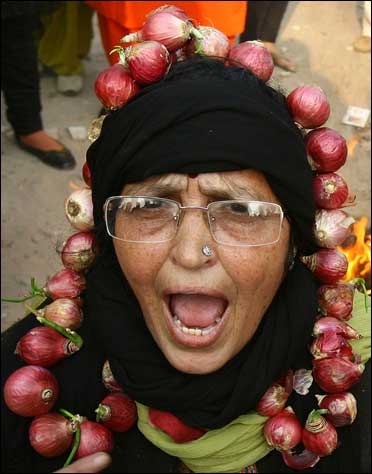
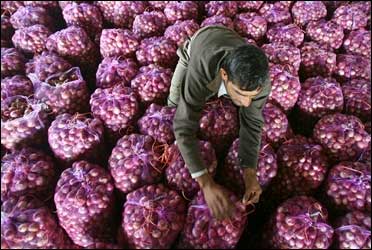
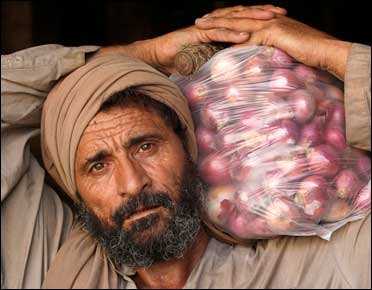
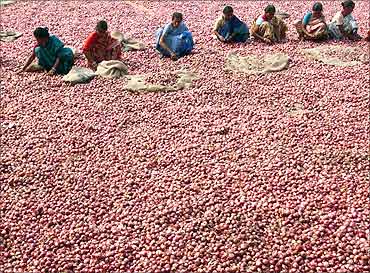
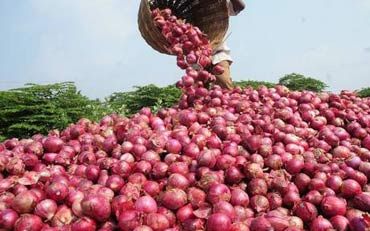
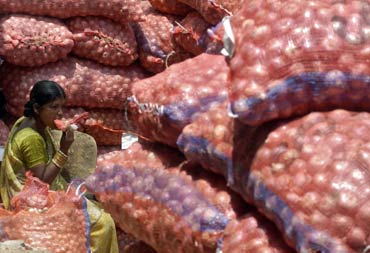
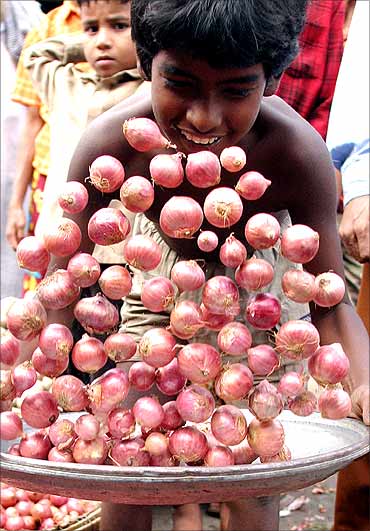
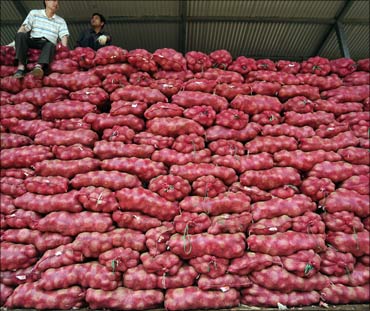
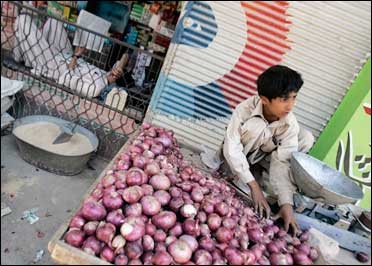
article